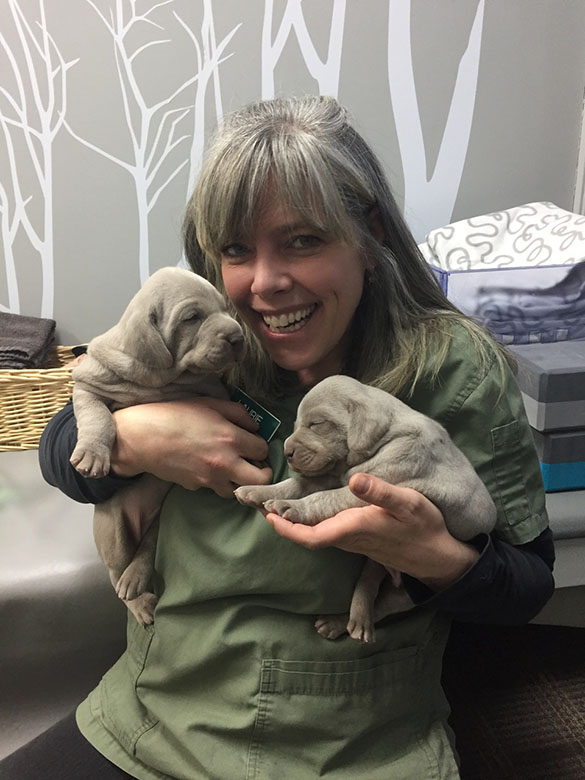Laurie's Blogs.
Dec 2013
Clarifications on 'Issues International' Blog
Hi Everyone,
Well, my blog post on Issues International, certainly did stir up some controversy and commentary. I must say that all of the commentary that came back to me was supportive or constructive regarding my original post, however I did receive two e-mails this week that asked for clarification on some points. So instead of posting a few more responses to the blog, I thought I would publicly clarify some of my comments in the original blog.
The commentary about lack of inter professional collaboration education in veterinary medicine is a truth. For an expanded view on that subject, see the full paper (presented at the 2012 Canadian Physiotherapy Congress, available at: http://www.fourleg.com/media/LEH&SB_IPC_written_document.pdf). As was pointed out, in one of the two letters asking for clarification this week, PT's are not taught to consult or collaborate with veterinarians - especially as it may pertain to communicable diseases and public health matters. This is very true. The One Health initiative has been a veterinary industry-led charge and PT's can educate themselves on this concept at www.onehealthinitiative.com. MY purpose to pointing out lack of formal inter (or intra) professional collaboration education in veterinary medicine as a factor to why vets may not refer to non vets (or other vets or techs with rehab training), was to elucidate a potential difference in mindset of the non-rehab-trained veterinarians. The rehab vets have already had exposure to PT's and their knowledge base. Most of them seem to be ready, willing, and eager to collaborate for the good of the patient. And the PT's come out of their rehab training with a respect for the depth of the veterinary knowledge base as well. However, if we are to try to understand the non-rehab-vet's reservation (or simple lack of thought) to referring to a rehab professional (vet, vet tech, or non-vet), then we need to identify factors that may be contributing to this collective experience. From this understanding is the only way in which we might work to address this issue. I once had a candid conversation with one of the founders of the ACVSMR (American College of Veterinarians in Sports Medicine and Rehabilitation). He said to me, "Laurie, you have to realize that PTs are the first group of human health care professionals that have approached the vet boards wanting to work together. Other groups have not, and the vets don't know how to react." This was truly enlightening for me to hear! So, by bringing up the lack of formal inter-intra-professional collaboration education in vet medicine, MY point was that we need to have a certain amount of understanding of and for the veterinarians out there that don't know what to with with us (any of us!). How do we do this? That is up for discussion… but do read the paper mentioned above… as much has been researched on this topic in human health care. I suggested that the time is right for adding this topic / subject to veterinary training.
Support for our Technicians, was commentary pertaining to practices where there is no rehab-trained veterinary (or PT) on staff to support the practice of rehabilitation by a veterinary technician (or PTA) with rehab training. This is concerning from a couple of standpoints, 1) The practice of animal rehab can be very lonely. Any solo-rehab-practitioner is left to sort out treatment planning, management of complicated cases, set backs or lack of progress on their own. It can be frustrating and at times detrimental to not have anyone else with a rehab background, with whom to discuss a case. 2) When we did our clinic statistics over a 3-year period, we noted that over 1/3 of cases referred to our clinic were coming without a veterinary diagnosis, thus leaving the PT's to make the physical therapy diagnosis. The majority of these non-diagnosed cases turned out to be soft tissue injuries or axial skeleton joint dysfunctions. The PTs on staff were able to identify and address these issues directly and communicated back to the referring veterinarian. So if these two problems exist, then the position holds true, we need to better support out technicians that are working in isolation. In fact FourLeg.com is one such way to support further education for technicians.
My discussion points about 'Physio-Balls' was intended to rally the PTs / physios to stand up for themselves, sing their own praises now and then, and acknowledge their own unique skills and knowledge. This was based on observations (and discussions) within the HUMAN field in general, which may be impacting our existence (or slow decline) in the animal healthcare world. One of the e-mails that came in this week had the following to say:
As a female who entered the veterinary profession when it was still a male-dominated profession, I understand the challenges to face to be accepted. It is a fine balance that is needed to be accepted as a woman in a leadership and professional role without being seen as being "bitchy" - this also happened in the business world. That balance comes when, I believe, you challenge yourself to learn everything you can about your area of interest, speak with your colleagues and step out of your box to help educate your colleagues (including other health care professionals) and lay people who may be involved in doing things in your area of practice as to how YOU can help THEM help THEIR patients / animals be the best they can be. Antagonism won't work, in my opinion. It can be frustrating, but I have found the approach works.
I believe we really are on the same page with this discussion point, so I will not elaborate further.
At the end of the original blog, I asked for comments and feedback. I reprinted one e-mail from a veterinarian that seems to insight a great deal of controversy. The following line in particular requires some background and an update.
First off, I heard about the ACVSMR’s recent policy statement about only wanting to recognize vets for rehab.
This comment was in reference to a position statement that was recently published by the board of the ACVSMR without passing it by the membership for comments or edits. It was in reference to the term 'direct supervision' of allied health professionals and the lack of definition for this term (and the potential ramifications of it's use in various States). Apparently the ACVSMR board is revisiting this statement.
I do hope that this blog helps to shed some light on my intention with the original blog, Issues International. I was hoping to incite discussion regarding ways for all of us to collaborate with the non-rehab veterinary community, and generate more referrals to our respective rehab practices.
As always, I wish you all good things and success in your practice!
Laurie
Laurie@FourLeg.com


